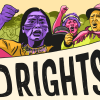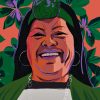Giving credit where credit is due: IPLCs must take center stage at upcoming biodiversity talks
“Now is the time for Indigenous Peoples and Local Communities to show the scientific knowledge that we have. Now is the time for Indigenous Peoples to tell the world that we need to take action”, says Ramiro Batzin, a leader from the Maya Kaqchikel people of Guatemala.
Ramiro Batzin is Co-chair of the International Indigenous Forum on Biodiversity (IIFB), the official voice of Indigenous Peoples and local communities (IPLC) in the Convention of Biological Diversity (CBD)
If you are not familiar with terms such as the CBD, the post-2020 Global Biodiversity Framework, or the upcoming COP15, this blog post is for you! More importantly, we’re going to address why a human rights-based approach is fundamental when it comes to halting the biodiversity crisis.
The long story short
The Convention on Biological Diversity (CBD) is a text adopted in 1993 by 168 countries, to serve as an international legal instrument for the conservation of biological diversity (also known as: biodiversity) whose goal is protect all life on earth—ecosystems, species, and genetic resources—to create a sustainable future.
In other words, the CBD is to biodiversity, what the 2015 Paris agreement is to climate change.
To implement the convention, the CBD has developed different strategic documents over the years discussed and approved through COP sessions (Conference of Parties) that gather every two years. The new instrument currently in discussion is the Post 2020 – Global Biodiversity Framework (GBF).
And why is global action on biodiversity so fundamental right now? Because biodiversity is declining faster than at any time in human history. The adoption of a new Global Biodiversity Framework is an opportunity for countries to agree on urgent priorities to stop biodiversity loss. This new instrument will be approved during the COP15, planned to held in Kunming, China, later this year, but negotiations have already started, with the Nairobi Sessions taking place in June.
In other words, the COP15 is as important as any climate COP. To sustain itself, humanity depends on biodiversity, as much as on a stable climate (and it’s all connected!).
Why are indigenous rights so important for biodiversity talks?
To stop the extinction crisis, it’s vital to approve a robust and ambitious GBF. But for that to happen, Indigenous Peoples and Local Communities (IPLC) need to be at the center of the negotiations. Why? Because IPLCs are the reason we still have biodiversity hotspots to start with.
As Lakpa Nuri Sherpa, an indigenous leader from Nepal and member of the IIFB says:
“Indigenous Peoples are the practitioners and living examples to prove to the world how human beings can coexist with nature.”
Recent reports have shown that “almost half of the large ‘wilderness’ areas in the Amazon Basin are in Indigenous territories and several studies have found that Indigenous peoples’ territories have lower rates of deforestation and lower risk of wildfires than state-protected areas.” [1] [2]
The vital contributions of IPLCs towards biodiversity conservation are gathered in the Local Biodiversity Outlooks which offers an amazing panorama of the critical work done by these communities to protect mother earth.
Yet, policy conservation often excludes IPLCs from decision-making, causing conflicts, land evictions, and human rights violations as the recent Maasai evictions in Loliondo, Tanzania have shown. [4] For those reasons, and as demanded by the IIFB, all policies on biodiversity must include a rights-based approach.
The new GBF is no exception. And if it wasn’t for the constant work and dedication of Indigenous leaders and their allies, specific mentions of human rights would have completely been missing from the text of the current negotiations. But we need to go a step further and make sure that those safeguards are included in the final text.
The IIFB demands are clear: the GBF must adopt a human rights-based approach to biodiversity conservation, include the right to Free, Prior, and Informed Consent, recognize and respect traditional knowledge, and secure land, territories, and tenure rights for the guardians of the world’s ecosystems.
Ignoring indigenous peoples’ claims on biodiversity, even though they are the ones who have contributed most to the conservation of their ecosystems, is a real injustice.
Add your voice to show to policymakers and country negotiators that indigenous leaders are not alone. Sign the petition now!
For more information on human rights risks related to conservation areas, you can explore Forest Peoples Programme resources.



